| Reviews & Columns |
|
Reviews DVD TV on DVD Blu-ray 4K UHD International DVDs In Theaters Reviews by Studio Video Games Features Collector Series DVDs Easter Egg Database Interviews DVD Talk Radio Feature Articles Columns Anime Talk DVD Savant Horror DVDs The M.O.D. Squad Art House HD Talk Silent DVD
|
DVD Talk Forum |
|
|
| Resources |
|
DVD Price Search Customer Service #'s RCE Info Links |
|
Columns
|
|
|
Web Therapy - The Complete First Season
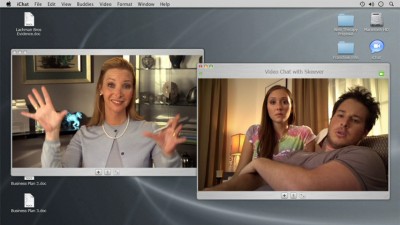
Web Therapy, the Showtime series centered around the ever-shining comic talent of Lisa Kudrow and co-created with her longtime collaborators Don Roos (the writer/director who gave her the kind of meaty roles she deserves but too rarely gets in his films The Opposite of Sex and Happy Endings), had relatively humble origins, but you wouldn't know it from the confident, endlessly energetic, fully fleshed-out gem it's evolved into. It started as something of a lark for the three friends/colleagues, a Web series with a low budget and low stakes, with Kudrow the main event as Fiona Wallice, a steely businesswoman-cum-therapist looking to reinvent herself (and hopefully garner some lucrative and flashy success) by pushing and shoving her "web therapy" concept -- three-minute live-chat sessions conducted online from home or office in which, as the very easily bored and frustrated Wallice witheringly asserts, you can get past the nonsense time-wasters of dreams and feelings to which the traditional 50-minute session is so tiresomely prone and get to the real work -- into something like a going concern. But the webisodes picked up enough interest from bigger names wanting to participate, including Lily Tomlin, Alan Cumming, and Kudrow's former Friends costar, Courteney Cox (with season 2, which begins July 2, set to include an appearance from none other than Meryl Streep), to get it picked up as a bona-fide TV series by the premium-cable movie channel. It's the network's win at least as much as it is the artists': Showtime, always coming in artistic second to HBO (Dexter is hardly The Wire, after all), has persistently been stuck with a less-consistent slate than their more acclaimed and popular competitor, but Web Therapy finally gives it, in terms of consistent quality, its very own Curb Your Enthusiasm.
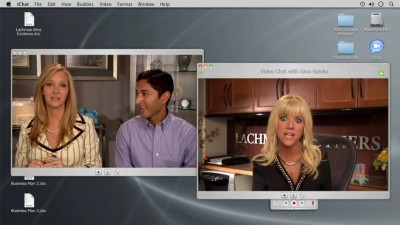
Despite the obvious differences in characters, story, and overall sensibility, that comparison is apt: Like Larry David's second home run with a show about nothing, Web Therapy has a loose, apparently throwaway, "real" (i.e., flatly videotaped) aesthetic that belies the sharp, well-honed comic intelligence at work in every scene. But despite its improvisational nature, with Kudrow and Internet interlocutors one-upping each other for laughs (each episode's closing credits give you a cherry on top of this sundae by intercutting goofs where the performers actually make each other break character through the uncontrollable mirth they inspire in each other), the series is at least skeletally scripted and does have a surprisingly elaborate arc, which works remarkably well within the seemingly tiny limits of the show's world (which is all very literally confined to a computer screen with webcam and Internet access). It includes over-the-top soap (or Soap?) elements like Fiona's too-comfortable, crumbling marriage to her half-estranged, cheating, possibly gay husband of 17-1/2 years, attorney Kip Wallice (Victor Garber); her grasping after an inheritance her icy-cold mother (Lily Tomlin, whom one can just as readily believe is Kudrow's mother as when Teri Garr filled the role on Friends) would rather give in its entirety to the Vietnamese brother Fiona never knew she had until abruptly informed; or the thinly veiled blackmail schemes on Fiona's part to get her former employers, high-profile, Securities Exchange Commission-investigated financial firm The Lachman Brothers, to "invest" in Web Therapy. (The Lachman brothers end of the video chats includes Steven Weber as "the good-looking Lachman brother"; 30 Rock's Maulik Pancholy as IT guy Kumar Prakash, moonlighting with Fiona as her tech support; and the ever-reliable comedic character actress Jennifer Elise Cox, perhaps best known for her great Jan Brady in the Brady Bunch movies, as amazing living proof, in the form of bubbleheaded, sexpot receptionist Gina Spinks, Fiona's office spy/gossipmonger and proof that there actually is still mileage left in the dumb-blonde character if you push the pedal all the way down to the lowest it will go). Meanwhile, Fiona has her reed-thin veneer of patience tested in various ways by clients played by such estimable co-improvisers as Bob Balaban and a hysterically rageaholic Jane Lynch.
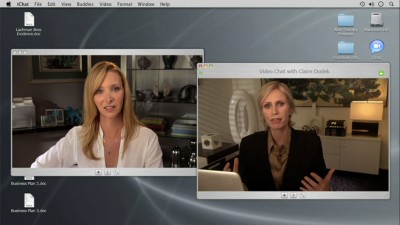
Web Therapy appears on your screen in such a simple, straightforward way as to make the conventional two-camera/soundstage sitcom aesthetic look like wide-open Neorealism, but it works ridiculously well. The look is simply the same as if you were working on your laptop or PC with a video chat; Fiona's computer's desktop provides the static background for the face-to-face two-shot/quasi-split-screen setups in which every encounter and conversation plays out, usually making an unobtrusive transition to cross-cut, full-screen shots of each character once the rapport is established. (The only technical aspect that seems, in this context, flatfootedly conventional is the too on-the-nose-whimsical music by John Swihart, which accompanies the otherwise nicely done, Hannah and Her Sisters-like, white-on-black onscreen text that bridges us from one scene to the next by giving us the funniest or most resonant line from the scene to follow.) Its creators could have set the show anywhere, since its aesthetic bounds demand exclusively these very tight interiors with no verifiable exterior or establishing shots required; in a bit of what I take as very funny ribbing toward East Coast pretention, careerism, social-climbing ambition, and "pedigree" from real dyed-in-the-wool Left Coasters (Kudrow, Roos, and Bucatinsky are denizens of L.A.), they have gone for putting Fiona in Philadelphia, her mother in Boston (with other clients/characters coming via webcam from all over the country). This WASP-y background explains Fiona's extravagant sense of entitlement and cool ability to come out of every breach of manners and ethics smelling fresh; it also sets the stage for this incomparably hostile, ultra-passive-aggressive mother and daughter's picking at each other with their prickly, patrician, inflated, and stuffy tones, so very ripe for any and all satirizing lines that Kudrow and Tomlin can come up with for the self-important ladies they're playing, whose unawareness of their own outrageousness only fuels exponential growth of the laughs.
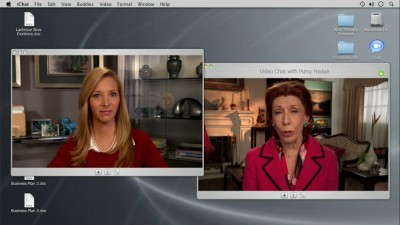
All the technical/aesthetic ingenuity is rightly centered around Kudrow, who holds the whole affair together without ever breaking a sweat. She is just wonderful as Fiona; for an actor with such a distinctive face and voice, Kudrow has proven remarkably versatile. Fiona is no Phoebe or Valerie Cherish (her also-brilliant character on the sadly short-lived HBO series The Comeback), which is to say she is distinctly different from any character Kudrow has played before, though she does belongs in the antisentimental Don Roos universe (his bland, disowned Bounce notwithstanding) Kudrow's frequently been a part of, where wounded, self-deluded, conscience-impaired people with thick, thick shells try and inevitably fail to mask their consuming vulnerability. Her brittle, imperious, haughty delivery is as hilarious as her blind self-regard. All evidence and explicit protestations to the contrary (it's especially funny the way she repeatedly insists that Kumar "stop the flirting" she feels he's indulging in with his talk of cord insertion and hard drives, even though his disinterest is very clear from the start and becomes more and directly stated as the show goes on), Fiona insists, with a stubbornness so indefatigable it's almost admirable, on believing that the world owes and would love to give her all the attention, love, and rewards she's never gotten from her mother, husband, or careers. This is the princess syndrome magnified times 100, and in this case, as in much comedy, we have the total inadequacy of someone trying to confidently, brave-facedly smooth the tragedies of their life into benignity making for cathartic laughs where there might just as easily, with the opposite spin, be depression and tears. Fiona Wallice's unfillable void of demanding neediness is what both drives her to and makes her utterly inappropriate for curing anyone's psychological woes, and her forced, phony gentility is the thinnest shell ever put up in an attempt to mask rage, frustration, disappointment, vindictiveness, and a million other very un-pretty emotions. In finding such a thoroughly effective and enjoyable manner in which to show us how constantly this close to cracking apart that shell is, Kudrow, Roos, Bucatinsky, and their gaggle of co-conspirators have whipped up some of the funniest, most entertaining television to come along in quite some time.
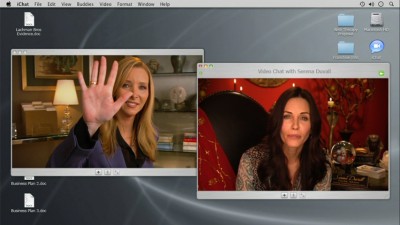
THE DVD:
Web Therapy is presented on two discs at its original televised aspect ratio of 1.78:1, and the entirely apt aesthetic of the show (it's shot on digital video that's lit and framed to identically match video-chat quality) is, in a nice coincidence, not the biggest challenge, transfer-wise. It looks just as it should here, with a certain intentional webcam flatness but no compression artifacts whatsoever to break the improvisational/real-time flow.
Sound:One would almost prefer the Dolby Digital 2.0 soundtrack (which lends itself to more realistically sounding like web-video-chat audio as it's most commonly experienced) regardless of home theater setup, but the 5.1 works unobtrusively on surround systems, too (this is not a show with any need for fancy sound effects, so the most noticeable thing is just a wider dispersal of sound, which could be preferable in larger spaces). The only sounds are really just dialogue, theme music, and occasional "boop" sounds as web therapy sessions and other video chats sign off, but it's all crystal clear, full, and overall nicely rendered in both mixes.
Extras:Commentary by Lisa Kudrow, Don Roos, and Dan Bucatinsky on every episode. The self-deprecating threesome banter like only people who've been through every aspect of it all together can, revealing in the process the involved and interesting (not to mention, from the sound of it, challenging) transition from web series to "real" TV show and the experiences of casting and working with the show's multiple guest stars, all while having a little fun at the expense of the awkward process of commentary-giving. If watching it gives you the sense that the series was enjoyable to make, that suspicion is confirmed here; these three play off each other well, and their off-the-cuff comedic chemistry here will come as no surprise after you've seen it in full bloom in the episodes themselves.
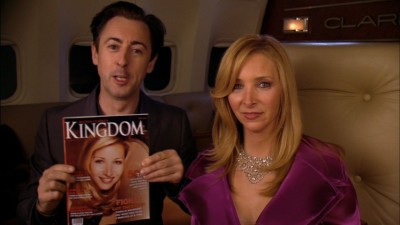
A modest gamble that pays off much bigger than one might expect, Web Therapy has a loose but consistently hilarious feel, with Lisa Kudrow's seemingly bottomless comic resourcefulness flowing through her characterization of entrepreneur/anti-therapeutic therapist Fiona Wallice. That energy also charges the performances of Kudrow's sparring partners in comedy, from Lily Tomlin as Fiona's mother to Steven Weber as a frazzled former boss and series co-creator Dan Bucatinsky as a spineless, borderline-masochistic patient. This kind of improvisational back-and-forth (so well facilitated here by the ingenious, deceptively simple, surprisingly durable conceit that everything we're watching is in the form of video chats seen on a computer screen through the webcam's eye) has the potential to become disastrous dead air; it's a high-wire act with no safety net that only looks easy when done brilliantly well. But Kudrow's roots in improv and her years of developing her wonderful talent for creating a character on the fly and finding the funniest words and entire physical attitudes in response to any given situation makes every new Web Therapy encounter a pleasure, for us if not for the eternally thwarted, put-out Fiona, her friends and family, or her poor clients, who are the perpetual prey of her rampant self-interest and unwarranted, hilariously delusional self-assurance. It's a creative endeavor that rose from small-scale, just-for-fun Internet origins to become a "real" TV show without losing that what-the-hell spontaneity in the transition, and the show's tone of escalating, improvisational one-upsmanship (the performers just goad and challenge each other to further heights of hilarity, right up to but never past the breaking point) remains as infectious as it ever was, if not more so. The talent involved are without exception ace professionals doing very fine and focused work, of course, but the pleasure, the intensive play of this kind of creativity is palpable; Web Therapy is a rare instance of something that really is as fun to watch as it seems like it was to make. Highly Recommended.
|
| Popular Reviews |
| Sponsored Links |
|
|
| Sponsored Links |
|
|
| Release List | Reviews | Shop | Newsletter | Forum | DVD Giveaways | Blu-Ray | Advertise |
|
Copyright 2024 DVDTalk.com All Rights Reserved. Legal Info, Privacy Policy, Terms of Use,
Manage Preferences,
Your Privacy Choices | |||||||













